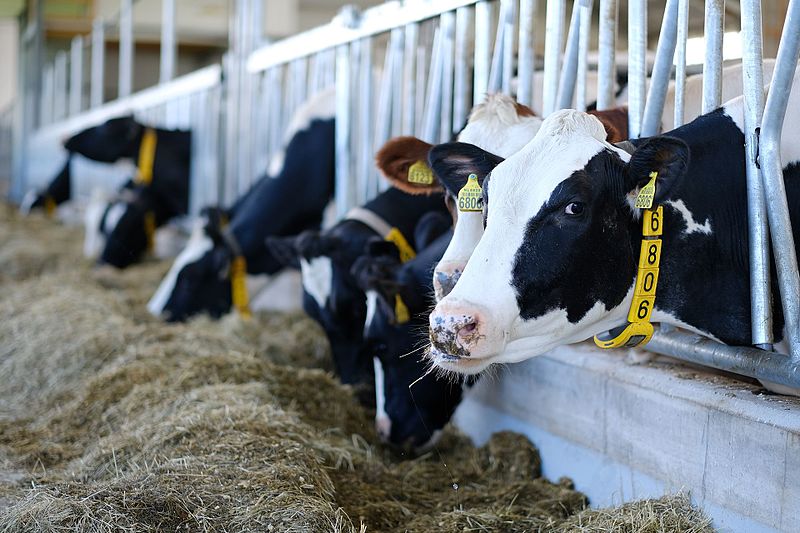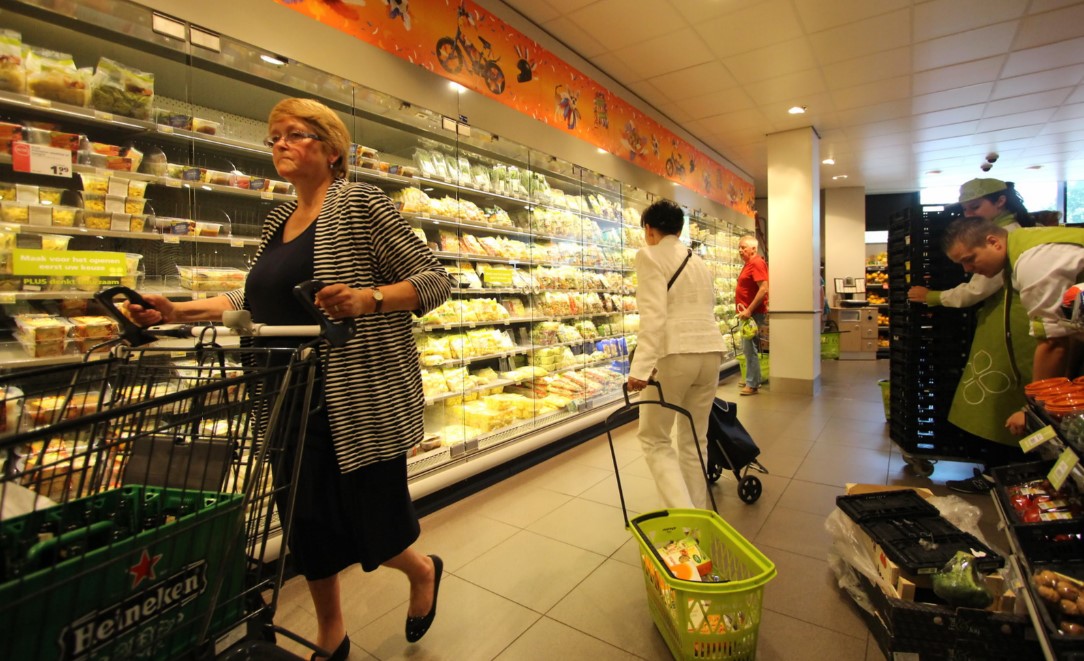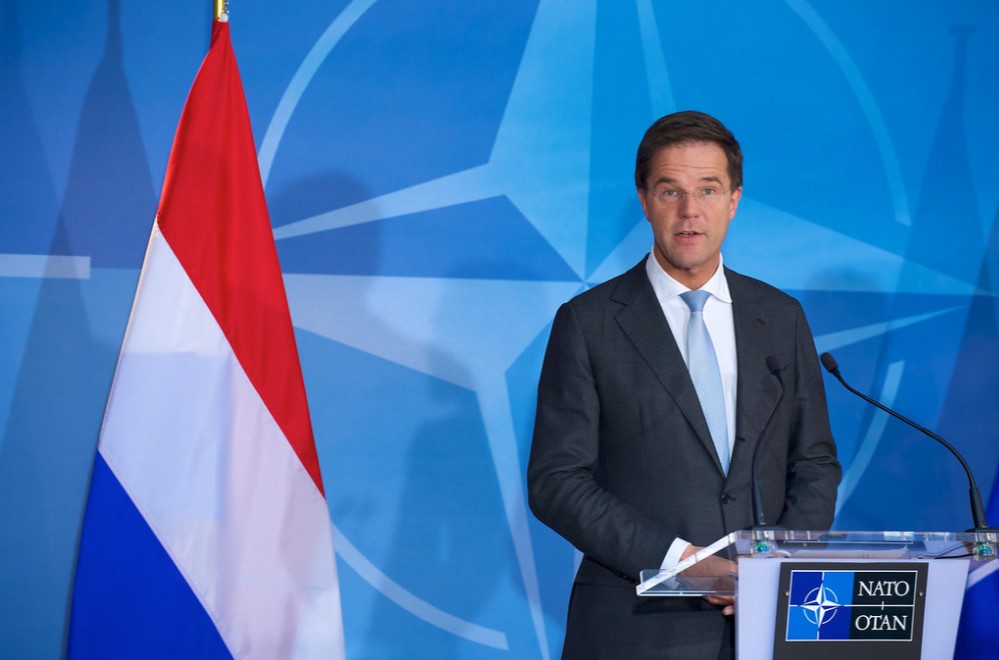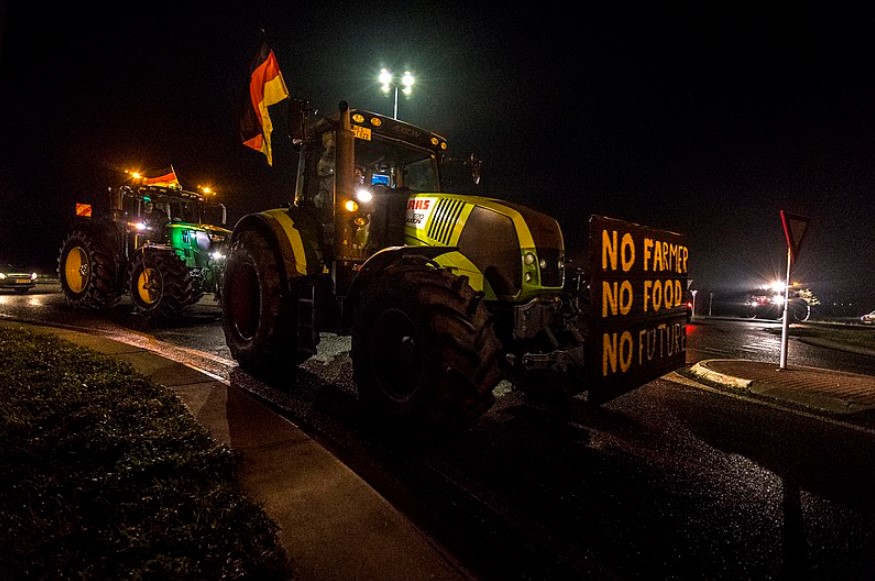Since June, the Netherlands has seen a new wave of militant, 40,000-strong farmers’ protests, aimed against government plans to reduce the emission of nitrogen compounds. These protests have reached the international media, with videos proliferating of heavy tractors blocking roads and supermarket distribution centres, and dumping manure outside the homes of politicians. What lies behind these protests, what class interests do they represent, and what is the position of the Marxists towards them?
In October 2019, the Netherlands saw a first wave of protests, with farmers in tractors demonstrating and causing long traffic jams. They were resisting plans by the Mark Rutte government to scale back the stock of cattle in the country by 30 percent, in order to reduce the emission of nitrogen compounds. Many farmers feared that this slowdown of livestock production would cause many farms to go bankrupt. In the past few months, these protests have returned on a larger scale.
The nitrogen question
The Netherlands is a densely populated country with an extremely productive agricultural sector. Since the end of the Second World War, Dutch farmers have been stimulated by successive bourgeois governments to increase productivity, which resulted in less-efficient operations being forced out of the market. While in 1950 there were 410,000 farms, in a country with a total population of 10 million people; in 2016 that number had shrunk to 55,000, compared to a total population of 17 million people.
 One particular problem in the Netherlands has been the high emission of nitrogen compounds, from rearing cows and other animals / Image: Sebastiaan ter Burg
One particular problem in the Netherlands has been the high emission of nitrogen compounds, from rearing cows and other animals / Image: Sebastiaan ter Burg
The total number of people working in agriculture (farmers, their family members, and hired labourers) in that period went down from 580,000 to 172,000; or from 15 percent to 2 percent of the total labour force. This enormous rise in productivity has long outgrown the national market. Indeed, the Netherlands is the second-largest exporter of agricultural goods in the world, after the USA! However, the development of the Dutch agricultural sector has had negative effects on the environment, biodiversity, and public health, due to the increased risk of mutation and zoonotic transmission of viruses, etc.
One particular problem in the Netherlands has been the high emission of nitrogen compounds, like ammonia and nitrogen oxides, the product of rearing cows, pigs, chickens and using artificial fertilisers. This industry has emitted so many nitrogen compounds that many nature reserves are being adversely affected, with a loss of biodiversity, nitrogen-dependent plants are outcompeting other flora and fungi. Nitrogen is also a greenhouse gas, emissions of which the Rutte government has committed to reducing by half by the end of the decade. Other sources of nitrogen emissions are heavy industry, construction projects, motorised traffic, and air traffic.
The bourgeois government of Mark Rutte (leader of the right-wing People's Party for Freedom and Democracy, VVD) was under pressure to curb the effects of the nitrogen emissions, but did not want to stymie profit production. In 2015 it came up with the Programma Aanpak Stikstof (Programme to Address Nitrogen, or PAS), a plan to regulate licences for agricultural expansion, construction projects, etc., based on the expected volume of nitrogen compounds emitted.
In 2019 the Council of State, the highest judicial authority, declared the PAS illegitimate. The reason was that it used ‘creative accounting’ to allow the farming industry to grow in return for pledges to compensate for nitrogen emissions in the future. These promises were based on absolutely nothing, and the whole plan resembled a farcical pyramid scheme. After this court decision, 18,000 licences for construction projects and business expansion were suddenly revoked. This caused big problems, as it threatened to stall economic growth and exacerbate a housing crisis. The government then decided to take measures to shrink the number of livestock in the agricultural sector (by far the biggest source of nitrogen emissions), leading to the protests in 2019.
The first wave of farmers’ actions in 2019 was cut short by the COVID-19 crisis and lockdowns in 2020, but the publication of the "Nitrogen Map" in June gave rise to a new wave of protests. This map offers advice to provincial governments about the areas in which farming activity has to shrink, and by what percentage.
This led to demonstrations where farmers with tractors went out onto the motorways, to blockades at distribution hubs of supermarkets, and roadblocks near the locations identified on the ‘Nitrogen Map’. In a more recent development, farmers have been taking “hard actions”, like setting up roadblocks on motorways by dumping rubbish, and torching bales of hay.
It is clear why the farmers are angry and it is understandable that a majority of the Dutch population has a measure of sympathy for them. The farmers are seen as a hard-working layer of the population that receives a relatively small amount of the value created by the agricultural sector, while middlemen and supermarkets take the bulk of the profits. There is a feeling among many in society that the farmers should not be the only ones to pay for this nitrogen crisis, which the Rutte government exacerbated through the failed policies in the PAS.
Still, this farmers’ movement is only focused on the government and its regulations. The leading farmers’ organisations do not criticise the banks and big supermarkets, who are the real culprits behind squeezing out the farmers. The movement simply demands maintaining the status quo, while it is clear that something fundamentally has to change. The lack of any challenge to the big capitalists is no surprise, given that the movement is funded by large agribusiness companies, in particular the producers of fodder for cattle, like AgriFirm and ForFarmers; and agricultural equipment, like Trioliet, according to NOS.
These fatcats have a clear vested interest in fighting the new regulations and have refused to participate in government talks on reducing nitrogen emissions. They prefer to sit in the shadows, holding the purse strings, while farmers take the lead, giving the impression of a spontaneous protest movement led by ordinary people. These parasites have no interest in the environment, nor the plight of farmers - they simply want to protect their profits.
No farmers, no food?
One argument emphasised by the protest movement is that, with less agricultural production in the Netherlands, there is the risk of a food shortage in the Dutch supermarkets. In reality, about 80 percent of Dutch agricultural production is produced for export. At the same time, about three quarters of what Dutch households spend on food is produced abroad.
 One argument of the protest moevement is Dutch supermarkets will have less food – but is this true? / Image: bertknot
One argument of the protest moevement is Dutch supermarkets will have less food – but is this true? / Image: bertknot
Worldwide, we can already produce enough food for 12 billion people. There is no reason anybody on this planet should have to die from hunger. The fact that every year millions starve is not related to absolute food production capacity, but criminally unequal distribution within world capitalism. Add to that in recent months the rise in global food prices resulting from the NATO-Russian proxy war in Ukraine, which has massively impacted the cost of grain, cooking oil and essential commodities used in food production.
At present, support for the farmers’ actions is deteriorating. The acts of dumping landfill (including asbestos!) and flaming bales of hay on motorways, while threatening workers who have to dispose of this rubbish with violence, has not done them any favours with the wider public, and is also creating a rift in the farmer’s movement itself.
The more moderate wing around the interest group LTO (the Organisation for Agriculture and Horticulture) wants to force concessions out of the government, but is open to a compromise. On the other hand, the far-right wing around the Farmers’ Defence Force is looking for a hard confrontation, and actively seeks out support from right-wing reactionary parties and groups.
This has led to a “movement of solidarity”, composed mostly of the same reactionary groups and activists that were also behind the anti-lockdown and anti-vaxx protests in 2020-21 (Nederland in Verzet, Forum voor Democratie, etc.). After the COVID-19 control measures were cancelled, they were looking for a new bandwagon to jump on.
A wild assortment of conspiracy theories and fake news videos are now making the rounds and are also being shared abroad by people like Donald Trump, Steve Bannon and reactionary news outlets in the USA and Canada. Some connections have been made with activists of the equally reactionary Freedom Convoy in Canada. The association with these far-right elements is also diminishing the sympathy for the farmers among the wider population of the Netherlands.
It is notable that the state forces have used a soft touch when intervening in these actions, especially compared to the way the police acted against blockades by left-wing and environmentalist groups, like Extinction Rebellion. Rather than crushing the farmers, the Rutte government wants to exhaust the movement and eventually strike a deal with its moderate wing. This is not an impossible task, since the farmers’ movement is not fundamentally opposed to the capitalist system that Mark Rutte represents.
Marxist position on the movement
While understanding that some working-class people have sympathy for the farmers’ movement, we have to be clear on its nature. The farmers’ movement is directed primarily against the government and its regulations, and is financed by big agribusiness. Consciously or unconsciously the farmers are pawns in the hands of one part of the capitalist class directed against another. For this reason we cannot support this farmers’ movement.
 The main problem is that there is no working-class alternative to the Rutte government / Image: NATO
The main problem is that there is no working-class alternative to the Rutte government / Image: NATO
This does not mean that farmers in general are the main enemy, or that this movement represents a fascist threat, as some on the left think. While we certainly oppose the reactionary elements, we should analyse this petty-bourgeois movement in a context of general impasse of Dutch capitalism.
The trust in the government and state institutions has reached record lows, having been hit by one scandal after the other. Years of cuts in public spending have led to problems in healthcare, education and childcare. There is a huge shortage of affordable housing. And now we have the problem of inflation, which in July reached 11.6 percent, the highest in 40 years. The Rutte government is not capable of solving anything, and can only kick the can down the road. The whole system is at an impasse, leading to anger among big layers of society.
The main problem is that there is no working-class alternative to the Rutte government. The old Labour Party is looking to fuse with the left-liberal Green Left, which clearly shows how weak they have become after decades of co-managing austerity. The left-reformist Socialist Party has bureaucratically expelled most of its remaining left wing and has degenerated into a chauvinist party which wants to attract voters from the far-right by copying their anti-immigration positions, and thus attracts neither the advanced working class nor radical youth.
In this vacuum, the ‘opposition’ to Rutte appears mostly in the form of bourgeois demagogues, like Pieter Omtzigt (a “clean” Christian-Democratic politician that broke with his party as a whistle blower over the childcare benefit scandal) and Caroline van der Plas (leader of the Farmer Citizen Movement, who claims to represent “the countryside”).
With the political field blocked, there is some pressure at the industrial front. At the moment, there is a labour shortage, leading to a more favourable position for the working class. There have been some militant strikes in the last period, including a wildcat strike at Schiphol Airport. The trade union bureaucracy however is trying to reach a “social agreement” with the bosses and government, to compensate for the rising level of inflation. It is crystal clear however that the bosses are not willing to do this, and this has already led to friction within the apparatus of trade union federation FNV. While the FNV bureaucracy is criminally trying to hold the workers back, it is clear that class struggle is on the agenda in the Netherlands in the coming years.
With this in mind, we should point out that the workers’ movement, after of course working out a militant programme for the workers themselves, should also come with measures to bring part of the farmers (and the middle class in general) to our side.
The majority of the Dutch farmers are petty-bourgeois business owners who work for themselves. They are being squeezed by the big supermarket chains that take the largest part of the profit of the agricultural end products, and the Rabobank that underwrites 80 percent of agricultural loans. The working class and the farmers have common enemies in big capital.
The only solution for the current nitrogen problems and other issues in Dutch agriculture is the integration of agriculture into a rational plan of production. By nationalising big agribusinesses, the Rabobank and supermarkets under democratic control of the workers, it will become possible to help the farmers make their production sustainable, but also to provide them with affordable loans and decent prices for their produce. This would mean they need not fear for their own financial situation and that of their families.
In addition, the other polluters need to be tackled. By nationalising major industrial groups we can invest in making their sectors production sustainable as well, while massive public investments in fast rail connections and public transport can reduce the nitrogen emissions of cars and air traffic.
The current movement will eventually reach a dead end and be forced to compromise, which will solve nothing. Only a revolutionary movement to overthrow capitalism, and replace it with rational democratic planning, can resolve the problems affecting workers and farmers alike; providing a decent, dignified existence for both while protecting the environment for future generations.

